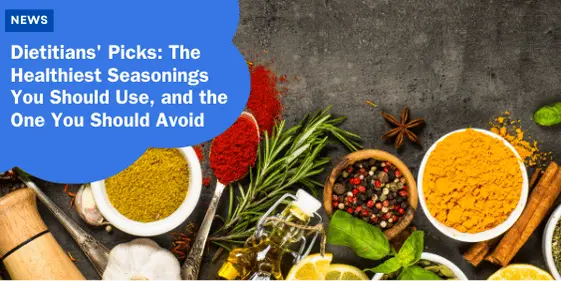Dietitians’ Picks: The Healthiest Seasonings You Should Use, and the One You Should Avoid

Eating well does not necessarily mean sacrificing flavor.
The strategic use of seasonings can transform a simple meal into an extraordinary culinary experience.
Herbs and spices, often derived from different parts of plants, are commonly used to enhance the taste of food.
Many of these seasonings also boast various health benefits, providing essential nutrients without the need for added calories, sugar, salt, or fat.
To delve deeper, we asked dietitians about the healthiest ways to season food and the advantages these herbs and spices can offer.
How to Season Food Healthily
“Natalie Rizzo, a registered dietitian and nutrition editor for TODAY.com, emphasizes that numerous herbs and spices offer natural health benefits and can enhance the flavor of dishes significantly.”
They offer a means to season dishes without contributing extra calories, sugar, salt, fat, or additives, making them an invaluable resource for those looking to maintain a healthy diet.
The Problem with Excess Sodium
Salt is a common seasoning that can significantly enhance the flavor of dishes.
While the body requires some sodium to function properly, an excessive intake can be harmful.
The U.S. Centers for Disease Control and Prevention (CDC) warns that consuming too much sodium can elevate blood pressure and increase the risk of heart disease and stroke.
The Dietary Guidelines for Americans recommend that adults limit their sodium intake to less than 2,300 milligrams per day, equivalent to one teaspoon of table salt.
Regrettably, many Americans exceed this recommended amount.
Benefits of Using Herbs and Spices
Using herbs and spices as seasonings not only enhances the flavor of food but also allows individuals to cut down on added salt and sugar.
What Is the Healthiest Seasoning?
Numerous herbs and spices contain beneficial vitamins, minerals, and antioxidants.
We asked experts to share their favorite seasonings that pack powerful health benefits.
Turmeric
Both experts we consulted listed turmeric, a golden-yellow spice derived from the root of a plant, as their top recommendation for a healthy seasoning.
Popular for spicing up curries, soups, and various meat and vegetable dishes, turmeric provides a robust flavor along with antioxidant and anti-inflammatory properties.
The active compound curcumin is credited for turmeric’s beneficial effects.
Traditionally used in Ayurveda and other traditional medicine systems in India and East Asia, turmeric is also available as a supplement for various conditions, such as arthritis, according to the NIH Center for Complementary and Integrative Health.
“Turmeric and curcumin have been shown to help reduce joint swelling and pain,” says Julia Zumpano, a registered dietitian with the Cleveland Clinic’s Center for Human Nutrition.
“Research shows turmeric’s potential benefits in reducing inflammation, particularly supporting joint and brain health,” adds Rizzo.
However, she points out that many studies focus on high doses, often in supplement form.
“The amount of turmeric typically used in cooking may not have the same health benefits as supplements, but it remains a healthy and flavorful seasoning,” Rizzo confirms.
Other Top Health Seasonings
Ginger
Ginger, whether fresh or powdered, is a potent aromatic spice that enhances the flavor of both sweet and savory dishes.
Used for thousands of years to season food and as a remedy in traditional Chinese medicine, ginger offers numerous digestive benefits thanks to its active compounds, such as gingerol.
According to Rizzo, ginger is commonly used to reduce nausea.
Research has also indicated that ginger may enhance gastric motility, reduce bloating and gas, and alleviate stomach pain.
Moreover, ginger’s anti-inflammatory properties mean it may help reduce menstrual cramps.
Much like turmeric, studies involving ginger often test supplements with larger doses.
However, its inclusion in daily cooking still makes for a delicious and healthful way to season food.
“Ginger is very potent and adds big flavor to food, potentially helping you cut down on salt in recipes,” Rizzo mentions.
Garlic
Garlic, part of the onion family, can be used fresh or in powdered form.
Raw garlic offers a sharp, pungent flavor, whereas cooked garlic takes on a buttery and nutty taste, making it a versatile addition to almost any dish.
Garlic and its active compounds, such as allicin, provide numerous health benefits, including antioxidant and antibacterial properties.
“Garlic can boost immunity, support heart health, and have a positive impact on blood vessels and arteries,” notes Zumpano.
Evidence suggests garlic may help reduce cholesterol levels, lower blood pressure, and even lower the risk of gastric cancer.
Despite these benefits, certain spices, including garlic, can be irritating to sensitive digestive systems, so it’s important to use it cautiously.
Cinnamon
Cinnamon, a rich and complex spice derived from the bark of cinnamon trees, has been used for centuries in both culinary and health applications.
Available in dried stick form or ground into a powder, cinnamon offers antioxidant and anti-inflammatory properties, along with some antimicrobial benefits.
Research on cinnamon for conditions like diabetes is mixed, but there is some evidence it may help lower blood sugar and improve insulin resistance.
It enhances the flavor of both sweet and savory foods, making it a versatile and healthy seasoning.
Basil
Basil is an aromatic herb that significantly boosts the flavor and nutrient content of many dishes.
Available in several varieties, basil can be used fresh or dried. Rich in vitamin K, it promotes bone strength and blood clotting.
It is also packed with antioxidants, which may protect cells against damage from free radicals and associated health problems.
Studies suggest that basil may have beneficial effects on blood sugar control, vascular health, cholesterol levels, immune function, and cognition.
Alongside basil, other nutrient-dense herbs like rosemary, thyme, parsley, cilantro, and sage are excellent choices for seasoning food healthfully.
Unhealthy Seasonings to Limit or Avoid
Prepackaged seasoning blends are often loaded with unnecessary additives.
“Prepackaged seasoning blends are what you want to watch out for,” warns Zumpano.
It’s crucial to read nutrition labels and ingredient lists carefully.
“Be cautious of seasonings with sugar or salt listed as the primary ingredient, and check the sodium or sugar content per serving size,” advises Rizzo.
Seasoning blends for seafood, Creole, Cajun, chili, and tacos often have higher sodium levels, with some containing over 300 milligrams of sodium per serving—about 13% of the daily recommended value.
While these pre-packaged seasonings might be fine in moderation for healthy individuals, they can easily push sodium intake over the recommended limits.
One serving size of a spice blend is typically one-fourth teaspoon.
“If you’re routinely adding 1 or 2 teaspoons of it to your food, it might be a good idea to reduce the amount,” suggests Rizzo.
For those with high blood pressure, kidney disease, or heart failure, limiting salt intake and seasonings that contain salt is necessary.
Always consult a doctor if you have questionsabout dietary restrictions tied to specific health conditions.
Opting for Healthier Alternatives
To maintain a palatable yet healthy diet, the experts recommend opting for low-sodium or sodium-free seasonings whenever possible.
Making homemade spice blends is also a fantastic way to control the ingredients, ensuring that your seasonings add flavor without unwanted additives.
Here are some tips for creating your own seasoning blends at home:
DIY Spice Blends
- Italian Seasoning Mix: Combine dried basil, oregano, thyme, rosemary, and sage for a versatile blend perfect for pasta dishes, grilled vegetables, and more.
- Chili Seasoning: Mix ground cumin, paprika, garlic powder, onion powder, and a pinch of cayenne pepper for heat. This blend is ideal for chili, tacos, and roasted meats.
- Herbs de Provence: A fragrant mix of thyme, rosemary, savory, marjoram, and lavender which is perfect for seasoning roasted poultry, vegetables, and fish.
- Curry Powder: Blend turmeric, cumin, coriander, ginger, and a bit of black pepper for a versatile seasoning perfect for curries, stews, and grilled meats.
- Garlic-Herb Blend: Combine garlic powder, parsley, and a touch of salt-free lemon zest for a zesty addition to poultry, fish, or roasted vegetables.
By creating these blends at home, you can precisely tailor the flavors to your liking while avoiding unnecessary sodium and preservatives.






